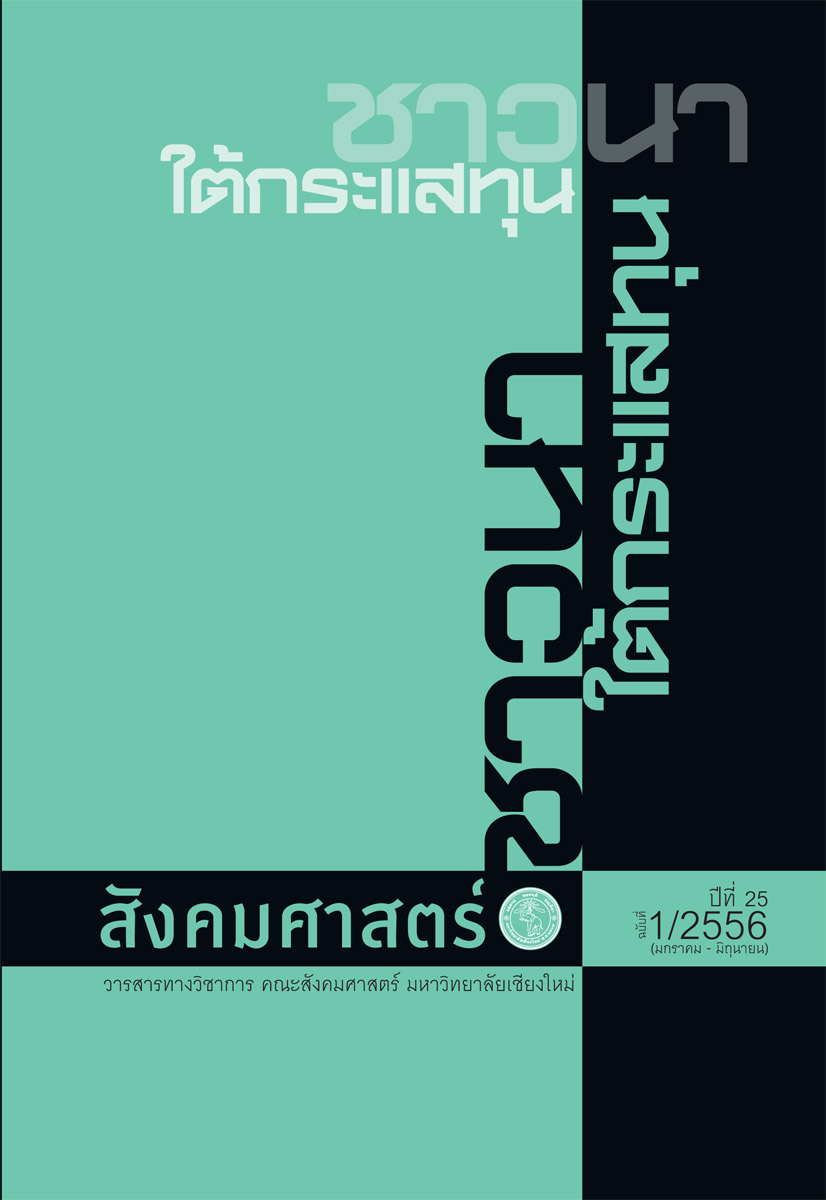Contested Upland Landscapes: The meanings of Feed Corn and Upland Farmers Identities
Main Article Content
Abstract
Feed corn farming is expanding throughout the forested uplands of Thailand. Although feed corn is a significant global commodity, several factors are working to drive the transformation of these upland landscapes and quicken the spread of feed corn plots. These changes cannot be completely understood under the rubric of global market forces. Similarly, the upland farmers who have adopted feed corn as a main cash crop cannot be understood simply as passive and unfortunate victims of economic globalization. This paper discusses the agency of local farmers and their influence on the expansion of feed corn farming. I argue that farmers have adopted feed corn farming as they struggle whit the imposition of forest conservation policies and ideals. Despite agro-economic globalization, the forest conservation ideals initiated by actors from outside of the local area have crucially impacted the agricultural practices of local farmers.
Article Details
All written articles published on Journal of Social Sciences is its author’s opinion which is not belonged to Faculty of Social Sciences, Chiang Mai University or is not in a responsibility of the journal’s editorial committee’s members.
References
กระทรวงเกษตรและสหกรณ์. 2550. เกษตรฯ ปั้นแผนพัฒนาการเกษตรกรอบ 5 ปี ตั้งเป้าเกษตรกรทำเกษตรตามแนวเศรษฐกิจพอเพียงเพิ่มขึ้น พร้อมเล็งเพิ่มอัตราการเติบโตภาคเกษตรเฉลี่ย 3% ต่อปี หวังกระตุ้นยอดรายได้เกษตรกรต่อครัวเรือนและพ้นขีดความยากจน. http://www.moac.go.th/builder/moac02/inside.php?link=info, 7 พฤศจิกายน 2550.
กระทรวงสาธารณสุข. 2553. ความปลอดภัยด้านอาหาร. http://www.fda.moph.go.th/
project/foodsafety/summary47.htm, 21 มิถุนายน 2553.
กลุ่มธุรกิจพืชครบวงจร. 2550. ซีพีจับมือร่วม ธกส., สกต. และหน่วยงานภาครัฐส่งเสริมเกษตรกรปลูกข้าวโพดเลี้ยงสัตว์ในพื้นที่นา. http://www.cpcrop.com/ข่าวสารกิจกรรม/ข่าวสารกิจกรรม/tabid/198/articleType/ArticleView/articleId/13/----.aspx, 18 June 2550.
อานันท์ กาญจนพันธุ์ และคณะ. 2547. ไร่หมุนเวียน สถานภาพ และการเปลี่ยนแปลง.
เชียงใหม่ : คณะสังคมศาสตร์ มหาวิทยาลัยเชียงใหม่.
ผู้จัดการรายสัปดาห์. 2008. นอมินีรากหญ้า ถึงยุค ‘คนไทย’ ตายหยังเขียด. http://
www.takchamber.com/index.php?lay=show&ac=article&Id=538700828&
Ntype=3, 7 สิงหาคม 2551.
มติชนสุดสัปดาห์. 2551. เจ้าสัวซีพีกับทิศทางการพัฒนาเศรษฐกิจของไทย. http://
www.biothai.net/web/showpage.php?h=53&s_id=26&d_id=26, 25 มีนาคม
2551.
สำนักประชาสัมพันธ์เขต 3. 2550. จังหวัดน่านประกาศลดพื้นที่ปลูกข้าวโพดเลี้ยงสัตว์
เฉลิมพระเกียรติพระบาทสมเด็จพระเจ้าอยู่หัว ทรงมีพระชนมพรรษาครบ 80 พรรษา. http://www.prdnorth.in.th/ct/news/showprint.php?ID=070103170024, 3 มกราคม 2550.
อานุภาพ นุ่นสง. 2550. ข้าวโพดซีพีรุกป่า จับตาวิกฤตความมั่นคงทางอาหาร. http://
www.newspnn.com/V2008/detail.php?code=r1_28042008_01, 28 เมษายน
2551.
สุรยุทธ์ จุลานนท์. 2549. สุนทรพจน์พิเศษในการประชุม “The Country Development
by the Philosophy of Sufficient Economy”, 17 พฤศจิกายน 2549.
ภาษาอังกฤษ
Anan Ganjanapan. 2008. Multiplicity of Community Forestry as Knowledge Space
in Northern Thai highlands. Working paper series No.35 Afrasian Center for Peace and Development Studies, Ryukoku University.
Buch-Hansen, Mogens. 2002. “The Territorialization of Rural Thailand : Between
Localism, Nationalism, and globalization,” Tijdschrift voor Economische
en Sociale Geografie 94(3) : 322-334.
Buergin, Reiner. 2003a. “Shifting Frames for Local people and Forests
in a Global Heritage : the Thung Yai Naresuan Wildlife Sanctuary in
the context of Thailand’s Globalization and Modernization”, Geoforum 34 :
375-393.
Buergin, Reiner. 2003b. “Trapped in Environmental Discourses and Politics of
Exclusion : Karen in the Thung Yai Naresuan Wildlife Sanctuary in the Context of Forest and Hill Tribe Policies in Thailand”. in C.O. Delang (ed.), Living at the Edge of Thai Society, pp. 43-63. London and New York : Routlege Curzo.
Castree, Noel and Bruce Braun, (eds.) 2001. Social Nature : Theory, Practice,
and Politics. Massachusetts and Oxford : Blackwell Publishers.
Chupinit Kasemanee. 1994. “Dubious Development Concepts in Thai Highlands :
The Chao Khao in Transition”, Law & Society Review 28 : 673.
Dutta, Kalpalata and Pornpen Khongkachonkiet. 2008. Reclaiming Rights in Forests : Struggles of Indigenous Peoples in Thailand. Bangkok : IWGLA and HPT.
Falvey, Lindsay. 2000. Thai Agriculture : Golden Cradle of Millennia. Bangkok : Kasetsart University Press.
Gupta, Akhil. 1998. Postcolonial Developments. Durham : Duke University Press.
Guthman, Julie. 2002. “Commodified Meanings, Meaningful Commodities : Re-thinking Production-Consumption Links through the Organic”, Sociologia Ruralis 42(4) : 295-311.
Kaltoft, Pernille. 1999. “Values about Nature in Organic Farming Practice and Knowledge”, Sociologia Ruralis 39(1) : 39-53.
Hayami, Yoko. 2006. “Negotiating Ethnic Representation between Self and Other :
The Case of Karen and Eco-tourism in Thailand”, Southeast Asian Studies 44(3) : 385-409.
Khongkachonkiet. 2008. Reclaiming Rights in Forests : Struggles of Indigenous
Peoples in Thailand. Bangkok : IWGLA and HPT. Li, Tania Murray. 2002. “Local Histories, Global Markets : Cocoa and Class in Upland Sulawesi”, Development and Change 33(3) : 415-437.
Latt, Sai S. W. 2008. The Hmong and Shan : Ethnic Politics, Labour Restructuring
and Agrarian Transformation in a Royal Upland Project in Northern Thailand.
Master of Art, Geography, York University.
Lohmann, Larry. 1993. “Land, Power and Forest Colonization in Thailand”, Global
Ecology and Biogeography Letters 3(4/6) : 180-191.
Nipon Poaongsakorn and Chaiyasit Anuchitworawong. 2006. The Decline and Recovery of Thai Agriculture : Causes, Responses, Prospects, and Challenges. in Rapid Growth of Selected Asian Economies : Lesson and Implications for Agriculture and Food Security, Republic of Korea, Thailand, and Viet Nam, Bangkok : Regional Office for Asia and the Pacific, Food and Agriculture Organization of The United Nations.
Pollan, Michael. 2006. The Omnivore’s Dilemma : A Natural History of Four Meals. New York : Penguin Press.
Sato, Jin. 2000. “People in Between : Conversion and Conservation of Forest Lands in Thailand”, Development and Change 31 : 155-177.
Scott, C. James. 1998. Seeing Like the Sate : How Certain Schemes to Improve
Human Conditions have Failed. New Haven : Yale University Press.
Stott, Phillip. 1991. Mu’ang and Pa : Elite Views of Nature in a Changing Thailand.
in Manas Chitakasem and Andrew Turton (eds.), Thai Construction of Knowledge, pp.364-370. London : School of Oriental and African Studies University of London.


